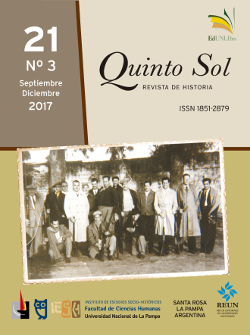States in crisis, exacerbation of ethnic-social conflicts in Latin America, 1980-2016
DOI:
https://doi.org/10.19137/qs.v21i3.2112Keywords:
state, social conflict, indigenous peoplesAbstract
Text of the keynote address by Jorge Pinto Rodriguez delivered in the Second International Congress "The indigenous peoples of Latin America. Advances, perspectives and challenges". Santa Rosa, La Pampa, September 2016.
Downloads
References
Ardao, A. (1980). Génesis de la idea y el nombre de América Latina. Caracas, Venezuela: Centro de Estudios Latinoamericanos Rómulo Gallegos.
Funes, P. (2006). Salvar la nación. Intelectuales, cultura y política en los años veinte latinoamericanos. Buenos Aires, Argentina: Prometeo.
Irurozqui, M. (1994). La armonía de las desigualdades. Elites y conflictos de poder en Bolivia, 1880-1920. Cusco, Perú: Consejo Superior de Investigaciones Científicas-Centro Bartolomé de las Casas.
Martínez Blanco, M. T. (1988). Identidad cultural de Hispanoamérica. Europeismo y originalidad americana. Madrid, España: Editorial de la Universidad Complutense.
Muñoz, B. (1996). Huairapamushcas. Temuco, Chile: Ediciones Universidad de la Frontera.
Pinto Rodríguez, J. (2003). La formación del Estado y la nación, y el pueblo mapuche. De la inclusión a la exclusión. Santiago, Chile: Dirección de Bibliotecas y Museos.
Pinto Rodríguez, J. (Ed.) (2015). Conflictos étnicos, sociales y económicos. Araucanía, 1900-2014. Santiago, Chile: Editorial Pehuén.
Revesz. B. (1989). Agro y campesinado. Piura, Perú: Centro de Investigación y Promoción del Campesinado.
Rovira, J. C. (1992). Identidad cultural y Literatura. Alicante, España: Gráficas Estilo.
Saintoul, C. (1996). Racismo, etnocentrismo y literatura. La novela indigenista andina. Buenos Aires, Argentina: Ediciones del Sol.
Shanin, T. (1983). La clase incómoda. Madrid, España: Alianza Universidad.
Vasconcelos, J. (1966). Raza cósmica. Misión de la raza iberoamericana. México DF, México: Espasa-Calpe.
Vicuña Mackenna, B. (1867). Conferencia ante el ‘Club de los viajeros’ de Nueva York sobre la condición presente i porvenir de Chile, en Benjamín Vicuña Mackenna, Diez meses de misión a los Estados Unidos de Norte América, II, Apéndice BSantiago, Chile: Imprenta de la Libertad, 14-34.
Zea, L. (1993). Fuentes de la cultura latinoamericana. México DF, México: Fondo de Cultura Económica.
Downloads
Published
Issue
Section
License
When submitting their contributions, authors must declare that they have the permission of the file or repository where the documents that are attached to the work were obtained, whatever their format (unpublished manuscripts, images, audiovisual files, etc.). Such permission authorizes their publication and reproduction, releasing the journal and its editors from any liability or claim from third parties.
Likewise, authors must adhere to the Creative Commons license called "Attribution - Non-Commercial CC BY-NC-SA", through which the author allows copying, reproducing, distributing, publicly communicating the work and generating derivative works, as long as the original author is properly quoted and acknowledged. It is not allowed, however, to use the work for commercial purposes. Authors may establish additional agreements for the non-exclusive distribution of the version of the paper published in the journal (for example, placing it in an institutional repository or publishing it in a book), with the acknowledgment of having been published first in this journal.
The publication of content in this journal does not imply any royalty or charge for taxpayers.
Quinto Sol adheres to the DORA (Declaration on Research Assessment) signed in San Francisco, California, on December 16, 2012, and to the Declaration of Mexico (Joint Declaration LATINDEX - REDALYC - CLACSO - IBICT).










4.png)
2.png)












_(2).png)


1.jpg)



1.jpg)





